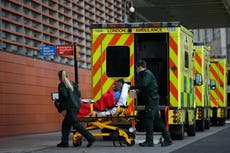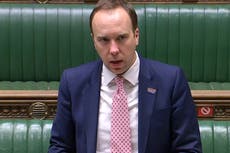‘Covid loves a crowd’: Britons urged to see in new year at home as infections soar and restrictions tighten
School opening delayed as new variant cases put intense pressure on NHS
Britain is facing its unhappiest new year, with more than 99 per cent of England plunged into near-lockdown conditions and coronavirus claiming almost 1,000 lives in a day.
The whole of the Midlands and northeast, along with large parts of the northwest and southwest, joined London and the southeast under “stay home” orders in the toughest tier 4 level of restrictions from a minute past midnight on New Year’s Eve, while the rest of mainland England going into the scarcely-milder tier 3.
The move, announced by health secretary Matt Hancock, placed 78 per cent of the population of England – 44m people – in tier 4, with pubs, restaurants and non-essential shops all closed, and almost 22 per cent in tier 3. Just the 2,200 inhabitants of the Scilly Isles remained in the “medium alert” tier 1.
Secondary schools were ordered to delay the return of pupils from their Christmas break in a bid to slow the relentless rise of infections with the highly contagious new variant of the disease, which has left hospitals reeling, particularly in London and the southeast.
And Boris Johnson joined senior medics to issue a plea for the nation to avoid parties and mark the end of 2020 quietly at home, as the NHS braced itself for a further surge of cases caused by the social mixing which occurred at Christmas.
NHS England medical director Stephen Powis warned would-be revellers: “Covid loves a crowd, so please leave the parties for later in the year.”
As news of the approval of the Oxford/AstraZeneca vaccine for clinical use raised hopes of a return to a more normal life by Easter, the latest official figures on deaths and hospitalisations provided a grim reminder of the toll which Covid could still inflict in the weeks to come.
Some 981 deaths were reported on Wednesday, the highest figure since 24 April, bringing the UK total to 72,548. A further 50,023 people tested positive for the disease, with the weekly case rate in England rising to 402.6 per 100,000, up by 32 per cent on the previous week.
Deputy chief medical officer for England Jonathan Van-Tam told a Downing Street press conference that one person in 70 was testing positive for coronavirus in the days before Christmas, compared to one in 900 in September.
“It is a pretty grim and depressing picture at the moment,” said Prof Van-Tam. “The situation in the UK is precarious in many parts already – particularly the southeast and London – and it is almost certainly true that the NHS has not yet seen the impact of the infections that will have occurred during mixing on Christmas Day.
“I know new year is coming up, I know it’s normally a time of great festivity and enjoyment, but you have just got to play your part now in bringing us back from this very dangerous situation that we find ourselves in.”
Professor Powis said high infection rates from the new variant were causing “significant pressure” on the NHS, with staff working “harder than ever” over the festive period to manage patients from the pandemic.
“It will continue to be tough over the next few weeks,” he said. “We know it’s the end of the year, it’s a time when people traditionally want to celebrate.
“But it’s absolutely vital that this year everybody continues to follow the guidance by staying at home and not mixing.
“Stay at home. Mark the new year with just nearest and dearest within the rules. This action will reduce infections, release pressure on hospitals and that’s how everybody can help to save a life.”
Mr Johnson held out the prospect of a return to something approaching normality by the end of March, provided the tiering system is able to keep the virus under control and the new vaccine is rolled out quickly.
He refused to name a date, but told ITV that chief medical officer Chris Whitty had said things could be “much, much, much better” by 5 April, adding: “There’s a world in which that date could be brought forward.”
However, Professor Van-Tam cautioned that, while the Oxford vaccine is expected to give significant protection from the worst symptoms of Covid after a first dose, it was not yet know whether it would prevent patients from passing the disease on.
“Even if you’re vaccinated, I can assure you that it’s very likely you’ll be protected from severe illness but I can’t give you the assurance that you won’t still pose a hazard to others through transmitting the virus,” he said.
“We just have to be patient on this point and give it another two or three months. Ask me that question again then and I hope I’ll give you a much more reassuring answer.”
Cities placed in tier 4 included Greater Manchester, Newcastle, Birmingham, Stoke, Derby and Nottingham, while the toughest controls also covered the whole of the northeast and Midlands, Lancashire, Cheshire and Cumbria in the northwest and Gloucestershire, Somerset, Swindon, Bournemouth, Christchurch, Poole, the Isle of Wight and the New Forest in the southwest.
The Liverpool City Region returned to tier 3 just weeks after being one of the few areas of the UK to win a reduction in controls thanks to its mass testing programme.
Joining it in the “very high alert” level were Rutland, Shropshire, Telford & Wrekin, Worcestershire, Herefordshire, York, North Yorkshire, Bath and North East Somerset, Devon, Plymouth, Torbay, Cornwall, Dorset and Wiltshire.
CBI policy director Matthew Fell said the tightened restrictions meant “a torrid end to an already tough year for many businesses” and said government support must be reviewed in January to ensure firms survive to the spring.
Mr Hancock told the House of Commons that the approval of the Oxford/AstraZeneca vaccine, with 530,000 doses available from Monday and millions more by the beginning of February, brought forward the day when all coronavirus restrictions can be lifted.
But he added: “We must act to suppress the virus now, not least because the new variant makes the time between now and then even more difficult."
Mr Johnson said his mood on a day when he enforced tougher restrictions on social and economic life at the very moment when the vaccine brought hope was one of “frustration plus optimism equals grim determination”.
He confirmed ministers had considered a national lockdown in this week’s review, but decided to stick with the regionalised tier system as the new variant had not caused the same surge in cases everywhere in the country.
“We are still in the tunnel of this pandemic,” said the prime minister. “The light however is not merely visible, thanks to an extraordinary feat of British engineering the tunnel has been shortened, or we’re moving faster through it.
“That gives me great confidence about the future in the spring.
“So for now, let’s redouble our efforts, let’s follow the rules and protect the NHS and together make 2021 a year in which we leave this tunnel behind us.”
Join our commenting forum
Join thought-provoking conversations, follow other Independent readers and see their replies
Comments



Bookmark popover
Removed from bookmarks